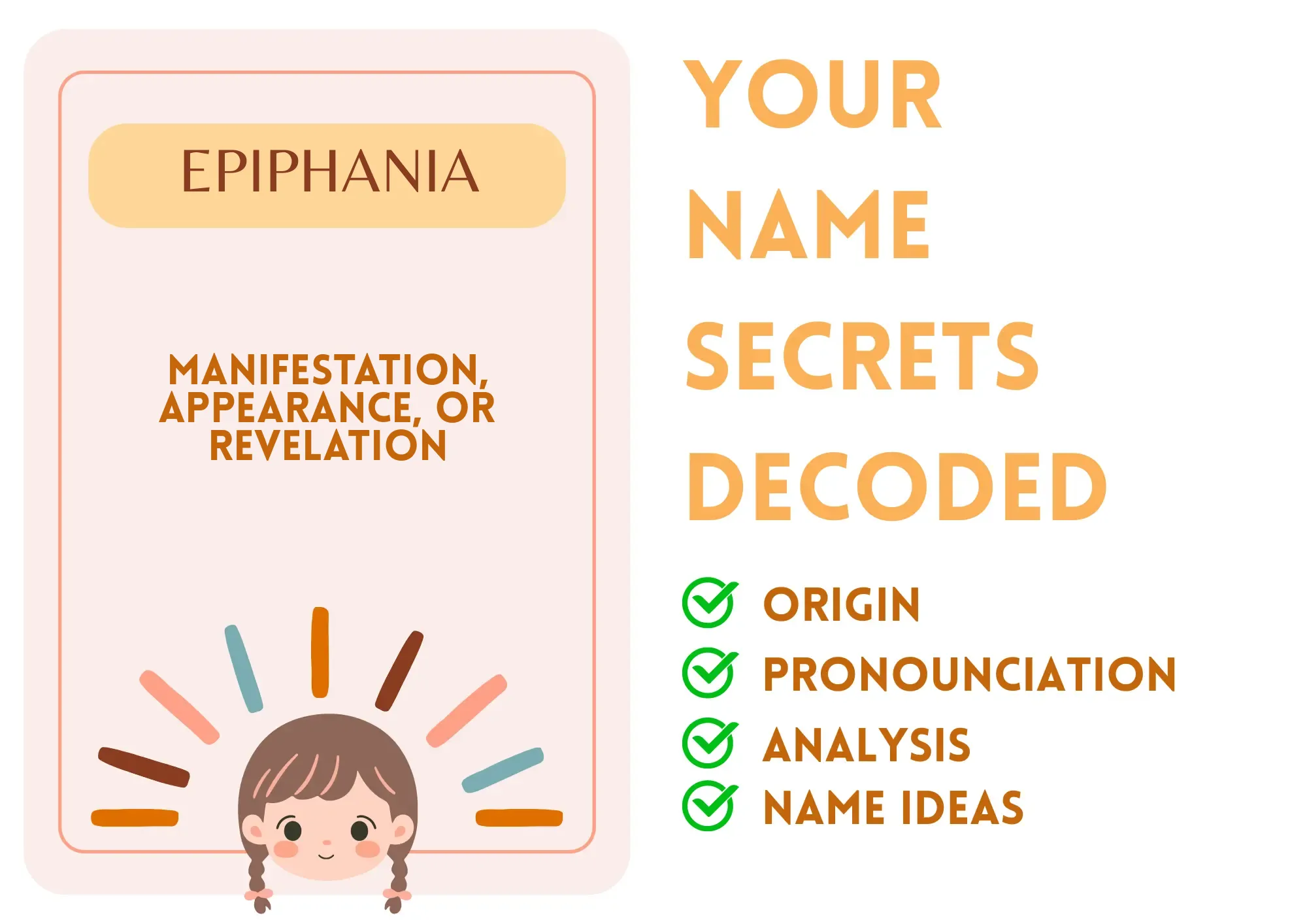
Epiphania
Epiphania is a name of Greek origin, derived from the word 'epiphaneia', which means 'appearance' or 'manifestation'. In a religious context, it is often associated with a sudden revelation or insight, particularly within Christian traditions, referring to the celebration of the revelation of God incarnate as Jesus Christ. This name embodies the idea of enlightenment, awakening, and realization.
Epiphania is predominantly a feminine name, though it can be used in a more unisex manner. It carries a sense of majesty and significance, often reflecting a deep connection to spirituality and revelation.
The name has historical relevance in Christianity, particularly with the feast of the Epiphany, which celebrates Christ's revelation to the Gentiles. Epiphania resonates positively, often evoking feelings of hope, insight, and clarity.
Basic Information
Gender: Girl
Sounds Like: eh-pih-FAHN-ee-ah
Pronunciation Explanation: The name is broken into four syllables: 'eh' as in 'bet', 'pih' as in 'pit', 'FAHN' as in 'fawn', and 'ee' as in 'see', concluded with 'ah' like in 'sofa'.
Summary and Meaning
Meaning: manifestation, appearance, or revelation
Origin: The name Epiphania has Greek roots, derived from 'epiphaneia', often associated with divine revelation in both religious and philosophical contexts.
Usage: Epiphania is traditionally a feminine name, though its unique sound allows for it to be considered unisex.
Name Number (Chaldean)
Name Number (Pythagorean)
Popularity (Global Rank)
Overall: 92453
Girls: 77177
Most Popular in
Religious and Cultural Significance
Religion: Christian
Background: In the Christian tradition, the name Epiphania is linked to the Epiphany feast, celebrating the revelation of Christ to the Gentiles, particularly represented by the visit of the Magi.
Cultural Significance: The name symbolizes enlightenment and moments of clarity in life, often chosen for women born on or around the Feast of Epiphany.
Historical Significance: Historically, Epiphania marks significant events of revelation in Christian texts and has been used in various forms throughout history to denote moments of divine or profound realization.
Popular Culture
Literature and Mythology: Although not widely featured in classic literature, the concept of epiphany appears in many literary works as a moment of insight or clarity, often reflecting on character development.
Movies and Television: While there are few direct representations of Epiphania in popular media, themes of epiphany can be found in numerous films and stories that focus on characters undergoing significant realizations.
Feelings and Perceptions
Perception: Epiphania is generally received positively, often viewed as unique and spiritually resonant. The name carries a sense of nobility and depth.
Positive Feelings: Majestic, insightful, spiritual, unique, and enlightening.
Negative Feelings: Some may find it difficult to pronounce or unfamiliar, potentially leading to misunderstandings or mispronunciations.
Practical Considerations
Ease of Writing and Calling: Epiphania is moderately easy to write and pronounce, consisting of four syllables that may require a little practice for some. It has a beautiful lyrical quality when spoken.
Common Typos and Misspellings: Epiphany,Epiphenia,Epiphanie,Epphania
Common Nicknames: Epi,Pia,Nia,Phia
Epiphania Popularity
Epiphania Usage and Popularity By Country
| Country | Rank (Overall) |
|---|---|
| Zimbabwe | 1555 |
| Tanzania | 1785 |
| Namibia | 2610 |
| Malawi | 2979 |
| Ghana | 3363 |
| Iceland | 3799 |
| Benin | 4287 |
| Niger | 20692 |
| Norway | 27537 |
| South Africa | 34465 |
Epiphania Usage and Popularity By City
| City | Rank (Overall) |
|---|---|
| Johannesburg | 27080 |
| Manchester | 8995 |
Compatibility Analysis
Famous Persons Named Epiphania
No results found for Epiphania.
Related Names
Similar Sounding Names:
Epiphany,Ephigenia,Eliana,Evangelina